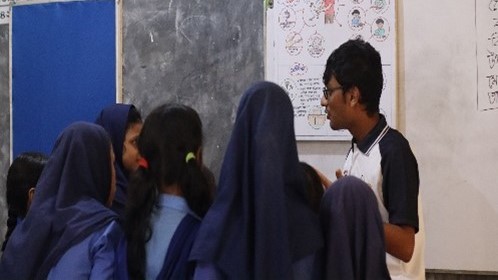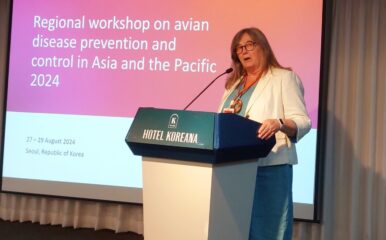
Hub holds school disease and hygiene awareness campaign
Published on 07/12/2023

A school-based awareness campaign organised by the One Health Poultry Hub in Bangladesh was held in the Chakaria upazila of Chattogram as part of the celebrations for World One Health Day 2023. Volunteers from two student organisations, the International Veterinary Students Association, Bangladesh (IVSAB) and One Health Young Voice, Bangladesh (OHYV,B), oversaw the day-long event.
The pupils were taught about common diseases that spread from animals to people (zoonoses) as well as personal hygiene, and they were also told about the veterinary profession and the role of the veterinarian in Bangladesh as part of this awareness programme.
Reducing risk
In Bangladesh, initiating a regular awareness campaign among school students especially in rural areas, about zoonotic diseases and personal hygiene is imperative for several reasons. First, Bangladesh is susceptible to zoonotic diseases due to the close proximity between people and animals in rural areas, where many families depend on livestock for their livelihoods. By educating students about the transmission of diseases between animals and humans, we can foster a culture of preventive measures, reducing the risk of outbreaks.
Additionally, school students serve as influential agents of change within their communities. By instilling good hygiene practices and awareness of zoonotic diseases, we empower them to disseminate crucial information among their families and peers. This grassroots approach can contribute significantly to breaking the chain of infection and promoting a healthier, more informed society.
For this campaign, six men and five women from the IVSAB and OHYV,B visited a government primary school, where they worked with 51 students in the fifth grade, 31 girls and 20 boys. The programme began with opening remarks delivered by the school’s headmistress, the education officer and upazila livestock. A senior representative from ACDI/VOCA, a non-governmental organisation, also attended.
Evaluation survey
As an integral component of the awareness campaign, we first conducted a brief survey among the students to evaluate their level of knowledge about personal hygiene and zoonotic diseases. A close-ended questionnaire was employed, encompassing scenario-based inquiries related to zoonoses such as rabies and foodborne diseases, as well as questions regarding individuals’ personal hygiene practices prior to and following their attendance at school.
Later, we showed the students a video highlighting the veterinary profession and its importance in Bangladesh, which they found fascinating.
A poster presentation session was also held. In this, we organised the students into five teams and appointed two of our volunteers to oversee the session, which encompassed infectious diseases such as dengue, rabies, anthrax and avian influenza, as well as the foodborne pathogen typhoid. The poster session had a high level of interactivity as the students engaged with the volunteers by asking questions and exchanging personal stories.
After the posters, a quiz was organized, comprising five questions related to the training theme. The winners were provided with small presents as a token of appreciation from our team. The programme concluded with brief closing remarks from the head mistress and the volunteer representative.
Ultimately, investing in the education of school students on these topics aligns with a proactive strategy to safeguard public health and mitigate the impact of zoonotic diseases in Bangladesh. It is essential that support on both the governmental and non-governmental levels be increased in the near future in Bangladesh if the country is hoping for a better chance of producing smart and capable future leaders.


